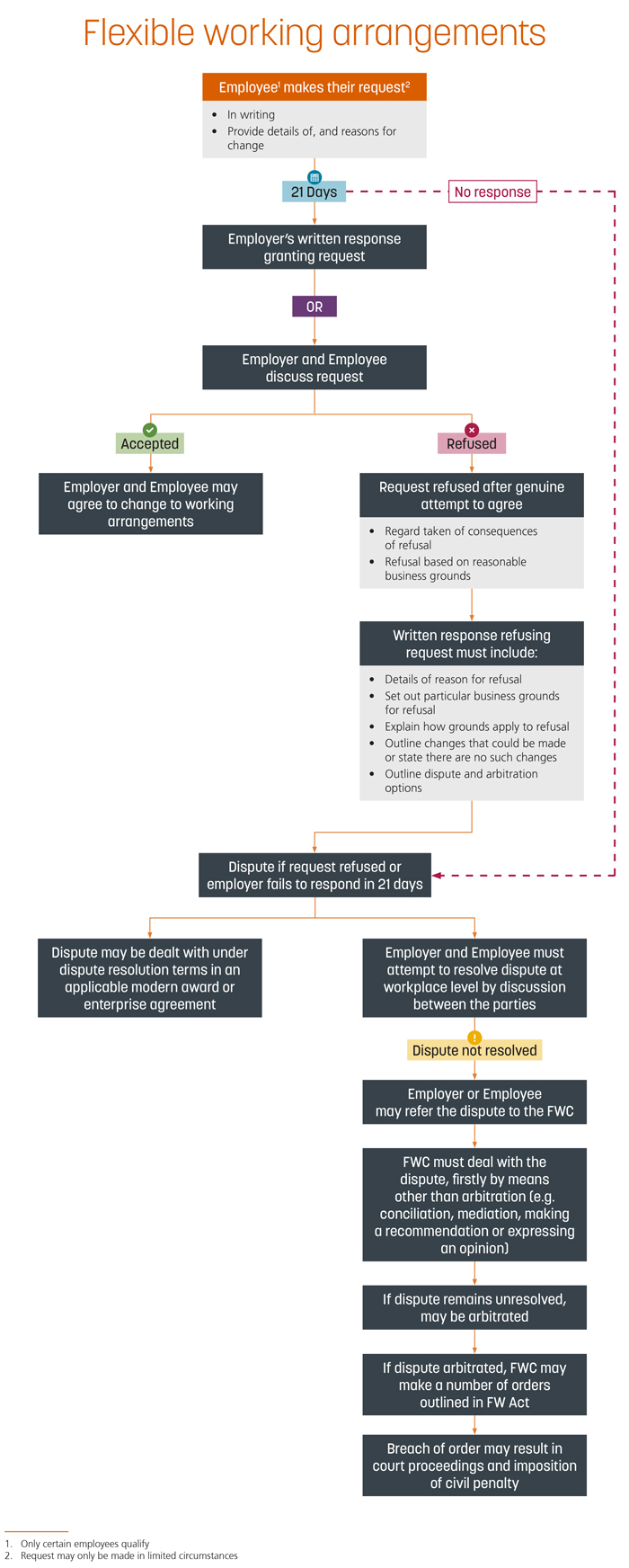Update: Fair Work legislation amendments - changes to flexible working arrangements and resolving disputes
17 January 2023
The Fair Work Legislation Amendment (Secure Jobs, Better Pay) Act 2022 received Royal Assent and became law on 6 December 2022.
This is an update of the article first published on 4 November 2022.
The provisions summarised below about the amendments to the requests for flexible work arrangements in the National Employment Standards (NES) will commence on 6 June 2023.
The amendments to the flexible working arrangements provisions in the NES expand the circumstances in which an employee may make a request when they, or a member of their immediate family or household, experiences family or domestic violence.
The amendments also firm up an employer’s obligations when responding to a request, including the requirement to discuss the proposed changes, genuinely try to reach agreement before refusing the request, and also provide detailed reasons for the refusal.
The measures also include details on resolving disputes around requests for flexible working arrangements and grant the Fair Work Commission (FWC) new, broad powers to resolve these disputes.
The amendments do not go as far as some employees would like or expect, and do not provide a broader right to request flexible work from home arrangements in Australia’s post-pandemic working environment.
Requests for flexible working arrangements
The current provisions in the NES set out the circumstances under which an employee may make a request for flexible working arrangements.
Several amendments have been introduced which:
-
expand the circumstances in which an employee may request a flexible arrangement to include where they, or a member of their immediate family or household, experiences family or domestic violence
-
increase an employer’s obligations when considering an employee’s request, with the aim of supporting or improving an employee’s access to flexible working arrangements, and
-
introduce dispute resolution provisions that empower the FWC to make orders where an employer refuses an employee’s request, including whether the employer has reasonable business grounds to refuse the request, or where the employer has not responded to the request within the required 21 days.
The introduction of a dispute resolution process to deal with disputes that arise from a refusal or non-response to a request is a significant amendment, as this aspect was specifically carved out of dispute resolution processes when the Fair Work Act 2009 was first introduced in 2010.
But it is also important to note that the circumstances where an employee may request flexible working arrangements under the NES remain limited. The specific circumstances do not address the key issue faced by employers and employees in post-pandemic Australia: how to agree on return to working in the office, after so many employees have been working from home since early 2020. These changes will not give employees who are reluctant to return to work greater rights to continue to resist a return to work at the office, unless of course they are covered by one of the specific categories.
Here is what the amendments do provide employers and employees, in relation to flexible working arrangements.
Employers responding to requests
The amendments provide a more detailed procedure for how employers must respond to requests for flexible working arrangements.
They enhance existing provisions in the NES to require employers to discuss requests with the employee and genuinely try to reach agreement prior to refusing an employee’s request. The employer must also provide detailed reasons for any refusal and inform the employee of any alternative working arrangements the employer would be willing to make to accommodate the employee’s circumstances.
Set out below is a flow chart for the process an employer must follow when responding to an employee’s request.
Refusing a request
As with the current provisions in the NES, an employer may only refuse a request on reasonable business grounds. These would include:
-
the new working arrangements requested would be too costly for the employer
-
the working arrangements of other employees cannot be changed to accommodate the request
-
it would be impractical to change the working arrangements of other employees, or recruit new employees, to accommodate the request, or
-
the new working arrangements requested would be likely to result in a significant loss in efficiency or productivity or have a significant negative impact on customer service.
An employer who breaches these provisions will risk the imposition of a civil penalty.
Disputes about flexible working arrangements
The amendments will empower the FWC to resolve disputes about requests for flexible working arrangements where:
-
the dispute relates to a request for a flexible working arrangements, and
-
either:
- the employer has refused the request, or
- 21 days have passed since the employee made the request, and the employer has not given the employee a written response to the request.
A party to the dispute may refer the dispute to the FWC where:
- either party has attempted to resolve the dispute by discussions at the workplace level, and
- those discussions have not resolved the dispute.
The FWC will be empowered to deal with the dispute in a manner it considers appropriate. The FWC must first deal with the dispute by means other than arbitration (unless there are exceptional circumstances). The FWC may first deal with the dispute by conciliation, or by mediation, making a recommendation or expressing an opinion. If the dispute remains unresolved, the FWC may then deal with the dispute by arbitration.
The orders that the FWC may make where it arbitrates a dispute are:
- if the employer has not given the employee a written response to the request – an order that the employer be taken to have refused the request
- if the employer has refused the request – an order about whether the grounds on which the employer refused the request should be treated as being reasonable business grounds or not
- if the FWC is satisfied that the employer has not responded, or not responded adequately to the employee’s request – an order that the employer take such further steps as the FWC considers appropriate. For example, this could include the FWC making an order that the employer give the employee a written response, or a further written response, and could set out matters that must be included in the response, and
- if the FWC is satisfied that there is no reasonable prospect of the dispute being resolved without such an order being made:
- an order that the employer grant the employee’s original request for flexible working arrangements, or
- an order that the employer make other specified changes to the employee’s working arrangements to accommodate the employee’s circumstances.
An employer who breaches an order made by the FWC will risk the imposition of a civil penalty.
Disputes about requests for flexible working arrangements can also be resolved using the dispute resolution provisions in a modern award or enterprise agreement. Under the current provisions, disputes about flexible working arrangements are expressly carved out these dispute resolution procedures.



